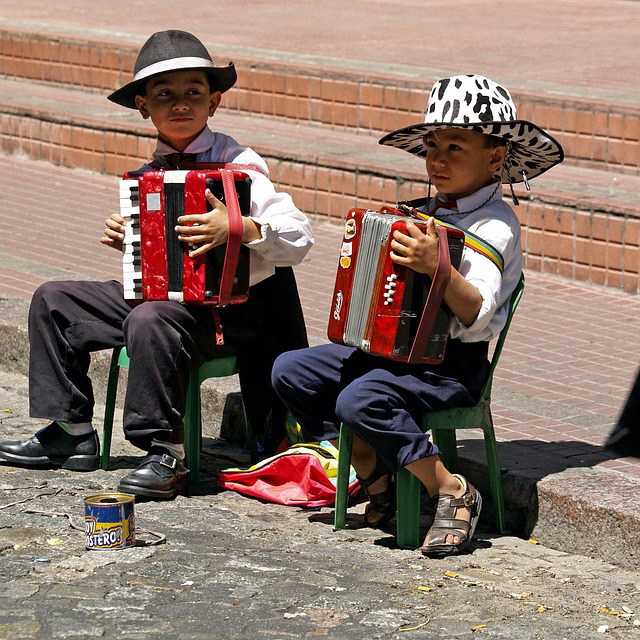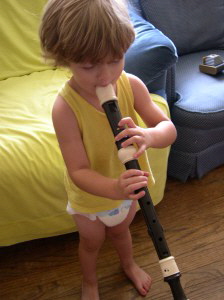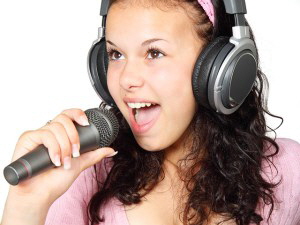|

Music For The Ages
August 28, 2014
Music for Babies:
The youngest infants can tell differences in melody and frequency. It really doesnâ™t matter what kind of music although some research shows music, especially classical music, is well liked by infants and likely increases their aptitude in math and language.
You can have music playing softly in the background. Perhaps your baby loves a particular lullaby and the way that you rock him to sleep as you listen or sing. The experience of being soothed helps your infant learn to soothe themselves.
As an activity, you can more actively listen to music with your infant or child and talk about the meaning of the words, the story it tells. Before your child is walking, you can provide the mobility by having them in your arms as you move to the music. Or let them watch you dance. A little bit older and you can help your child act out how the song sounds; happy, sad and so on. âIf Youâ™re Happy and You Know Itâ evokes and teaches what happiness is.
Have simple instruments to use in play and exploration. Age appropriate instruments help children learn more about music. Percussion instruments are great for small children. Instruments like tambourine, drum, xylophone (really a glockenspiel), egg shaker, rattles, and bells for example.
Glue, non-toxic glue of course, shut a plastic bottle with some dried beans in it for a simple rattle.
Get your child started early hearing music and creating their own sounds.

Music for Toddlers
Your child may have special music talents that you can encourage through imaginative play. Music may be one of your childâ™s special gifts. For every child music can offer life long benefits. Variety. We eat different foods. Listen to different music.
Children as young as three show real interest in music. This is a great time to introduce music into games that use movement, dancing, clapping, and jumping. Singing in tune, marching to a beat are among the first steps in processing music. Making sense of music exercises different parts of the brain building connections in different brain centers. Providing a rich music environment gives your growing child opportunities to develop their perhaps natural musical talents through their play and experimentation.
A growing body of evidence has determined that from birth to age nine is an important time for music development. New research shows music lessons for children before age seven, permanently changes the way the brain coordinates movement with sight and sound. The increased connections between motor and sensory areas of the brain create permanent connections that can be used and enhanced in the future.
Music for School-age
 Your role as an adult is to provide an environment where your child can initiate and direct music activities in their supervised play. Stimulate their natural curiosity by being interested in their musical explorations. Your role as an adult is to provide an environment where your child can initiate and direct music activities in their supervised play. Stimulate their natural curiosity by being interested in their musical explorations.
Using an analogy to language: you can see how being exposed to language helps the child to learn to speak. Children also have the potential to learn music through exposure, encouragement and opportunity. By first grade, some children can accurately represent the music of their culture. These children have developed two skills. First is the ability to listen, interpret and categorize music. And secondly the gross and fine motor skills, physical abilities to manage a musical instrument.
Benefits of music education include enhanced:
- Creative problem solving.
- Vision
- Balance
- Hearing
- Speech
- Behavior: Social Skills. Teamwork, Taking turns
- Sensation
- Movement: Large and small motor skills.
- Emotion
- Concentration
- Coordination
- Relaxation
- Self-confidence
- Patience
Turn on the stereo. Restore or refresh your enjoyment of music. Play lullabies for your infants. Toddlers will enjoy songs like nursery rhymes. Preschoolers often enjoy folk songs. School age children will follow their peers. Encourage natural curiosity in music by having age appropriate musical instruments around. Involve your kids in formal music lessons as early as possible. Encourage your musically inclined children to continue learning.
Sharing music with your family is one more way to give and receive love.
See this video on how music positively impacts your brain.
|